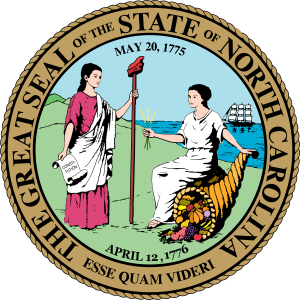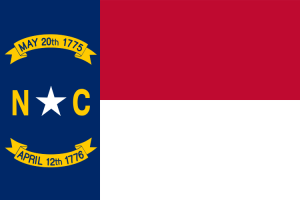
In late May 1775, the Scots-Irish settlers of remote Mecklenburg County, in the Carolina backcountry, received news by express messenger of the Battles of Lexington and Concord that had occurred a month earlier. As one local militia leader named John McKnitt Alexander recalled, “We smelt and felt the Blood & carnage of Lexington, which raised all the passions into fury and revenge.”[1]
Exactly what occurred next became the subject of considerable controversy over the next two hundred years. Some witnesses claimed that the leaders of Mecklenburg County had declared themselves “free and independent” of British rule in a document called the “Mecklenburg Declaration of Independence.” That document has never been found, however, and historians violently disagree on whether it actually existed at all.
Lost in that argument, however, is the fascinating (and uncontested) story of what the Mecklenburgers did do. On May 31, 1775, they passed and published a series of resolutions called the Mecklenburg Resolves which voided all British appointments in the County, created new laws by which to govern themselves, and prepared for open war with Great Britain. Declaration or no declaration, the Mecklenburg Resolves were an audacious and courageous statement of their intent to be free.
These resolves lay undiscovered until 1838, when a historian named Peter Force discovered a copy in the Massachusetts Spy dated July 12, 1775. “The Resolutions of Mecklenburg county, North Carolina, of May 20, 1775, dissolving all political connection between the ‘citizens’ of that county and Great Britain” Force wrote in the Daily National Intelligencer of December 18, 1838, “have excited more attention the last eight years than any other occurrence of the Revolution.” Force believed that the Mecklenburg Resolves constituted “a general Declaration of the Independence of all the Colonies.”[2]
The preamble of the Resolves said:
Whereas, by an address presented to His Majesty, by both Houses of Parliament, in February last, the American Colonies are declared to be in a state of actual rebellion, we conceive that all laws and commissions confirmed by, or derived from, the authority of the King or Parliament, are annulled and vacated, and the former civil Constitution of these Colonies, for the present, wholly suspended.
The first resolution that followed announced that “all commissions, civil and military, heretofore granted by the Crown” were “null and void” and “the Constitution of each particular Colony wholly suspended.” The second delegated “all Legislative and Executive powers” to the “Provincial Congress of each Province.” In other words, they had the presumption to take authority from Britain and return it to each State Congress!

“As all former laws are now wholly suspended in this Province,” continued the Resolves, “and the [Continental] Congress have not yet provided others, we judge it necessary, for the better preservation of good order, to form certain rules and regulations for the internal government of this county, until laws shall be provided for us by the Congress.”
The Mecklenburg Resolves were a bombshell at the time, as they constituted the earliest known example of the dissolution of British rule in the American colonies.
Spurred on by Force’s discovery, other historians searched for more evidence about the Resolves. A longer version (twenty resolutions in all, rather than four) was found in 1847 by Dr. Joseph Johnson in the The South-Carolina Gazette dated June 13, 1775. (Currently in the possession of the Charleston Library Society in Charleston, SC).
The additional resolutions found by Johnson were largely administrative and dry. They read like the bye-laws of a new government, and dealt with such issues as the court calendar, election of constables, and so forth. They clearly were intended as provisional legislation, until the Continental Congress provided new laws.
The final resolutions, however, gave an interesting window into the Revolutionary frame of mind of the settlers (remember, this is May 1775, more than a year before the Declaration of Independence).
That these Resolves be in full force and virtue, until instructions from the Provincial Congress, regulating the jurisprudence of the province, shall provide otherwise, or the legislative body of Great-Britain, resign its unjust and arbitrary pretensions with respect to America.[3]
The twentieth and final clause instructed “Colonel Thomas Polk, and Doctor Joseph Kennedy, to purchase 300 lb. of powder, 600 lb. of lead, 1000 flints, for the use of the militia of this county, and deposit the same in some safe place as the Committee may hereafter direct.” They were signed by Ephraim Brevard, Clerk of the Committee.
The Resolves showed that the backcountry settlers had thrown off the power of the British crown and were arming themselves for what might come next.
Little wonder then that the Royal Governor of North Carolina, Josiah Martin, on seeing the Mecklenburg Resolves reported to his superiors in London that “the Resolves of the Committee of Mecklenburgh, which your Lordship will find in the enclosed Newspaper, surpass all the horrid and treasonable publications that the inflammatory spirits of this Continent have yet produced.”[4]
On June 25, 1775, Martin called an urgent meeting of his Honorable Council to evaluate the alarming and deteriorating situation. In the backcountry, said Martin, there had been of late, a “most treasonable publication of a Committee in the County of Mecklenburg, explicitly renouncing obedience to His Majesty’s Government and all lawful authority whatsoever.”[5]
Until Force found them, the Mecklenburg Resolves were largely forgotten, but their “horrid and treasonable” character speaks to the ferocious and spirited character of the men who made them.
[1] John McKnitt Alexander, Rough Notes, in the Southern Historical Collection, Wilson Library, UNC-Chapel Hill.
[2] Preamble plus four resolves in the Daily National Intelligencer (Washington, DC), December 18, 1838.
[3] The text quoted is from the original version of The South-Carolina Gazette; and Country Journal of June 13, 1775 [No. 498] held in the collection of the Courtesy of the Charleston Library Society, Charleston, SC.
[5] 10 Colonial Records of the State of North Carolina, Minutes of the North Carolina Governor’s Council, June 25, 1775, 38.






Recent Articles
Teaching About the Black Experience through Chains and The Astonishing Life of Octavian Nothing
Review: Philadelphia, The Revolutionary City at the American Philosophical Society
Joseph Warren, Sally Edwards, and Mercy Scollay: What is the True Story?
Recent Comments
"The 1779 Invasion of..."
Sorry I am not familiar with it 2 things I neglected to...
"“Good and Sufficient Testimony:”..."
I was wondering, was an analyzable database ever created? I have been...
"Joseph Warren, Sally Edwards,..."
Thank you for bringing real people, places and event to life through...